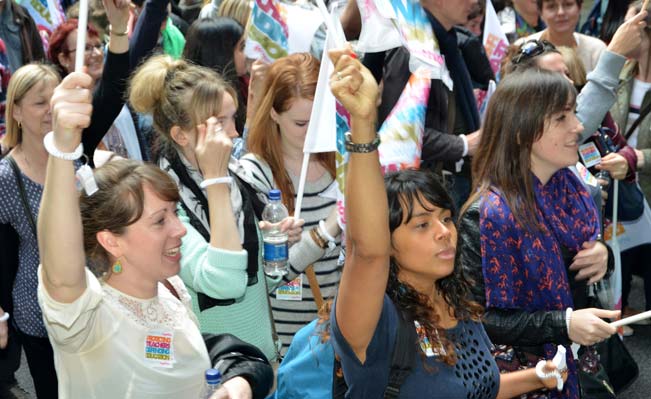 Teachers on the march in London, 2013. Photo: Anne Koerber
Teachers on the march in London, 2013. Photo: Anne Koerber
Five years ago Counterfire was launched as an organisation on International Women’s Day 2010, with the publication of A Feminist Manifesto for the 21st Century. It remains a timely analysis of the challenges that face us in the struggle for women’s liberation
1 Globalisation and neoliberalism have had a profound effect on the lives of millions of women. Capitalism itself has created new forms and manifestations of women’s oppression.
2 Women’s oppression is a product of class society which has existed for thousands of years. It was only with the development of capitalism that large numbers of women developed a consciousness of their position and the ability to do something about it.
3 Women have been drawn into the workforce in millions but working in factories, offices and shops has not led to an improvement in women’s lives far less to liberation. Women suffer exploitation at work as well as still shouldering the double burden of family and childcare as well as paid work.
4 Women’s traditional role as wives and mothers has not disappeared but has been reinvented to fit in with the needs of exploitation. They are now expected to juggle all aspects of their lives and are blamed as individuals for any failings in family or work life.
5 The talk of glass ceilings and unfairly low bonuses for women bankers miss the point about liberation, which is that liberation has to be for all working women and not just a tiny number of privileged women.
6 Although all women suffer oppression and face discrimination, their life experiences are radically different. Women are not united as a sex but are divided on the basis of class. Middle and upper class women share in the profits from the exploitative system in which we live and use this benefit to alleviate their own oppression. Working class women are usually the people who cook, clean and provide personal services for these women, receiving low wages and often neglecting their own families to do so.
7 Women are more than ever regarded as objects defined by their sexuality. The commercialisation of sexuality with its lad and ladette culture, its pole dancing clubs and its post-modern Miss World contests keeps women being judged as sex objects as if nothing has changed since the 1950s.
8 This objectification, alongside women’s role as supposedly the property of men, leads to domestic violence, rape and sexual abuse. This abuse is under recognised and under reported. It was only in the 1960s and 70s that these issues began to be viewed as political.
9 To control their own lives, women must control their own bodies and sexuality.
10 Capitalist ideology prioritises the family and the subordinate role of women and children within it, while at the same time forcing individual members of the family to sacrifice ‘family life’ because of the pressures of work and migration.
11 The priorities of the profit system and the existence of the privatised family means that women’s oppression is structured into capitalism. Any genuine liberation has to be connected to a wider movement for human emancipation and for working people to control the wealth that they produce. That’s why women and men have to fight for liberation. Socialism and women’s liberation are inextricably connected.
12 We will not win without a fight. Every great social movement raises the question of women. In the 19th century the movement for women’s emancipation took its name from the movement to abolish slavery. In the 20th century women’s liberation took its name from the movements against colonialism around the world. 21st century women’s liberation has to fight to change the world and to end the class society which created oppression and exploitation in the first place.
Originally published on Counterfire on 8th March 2010

